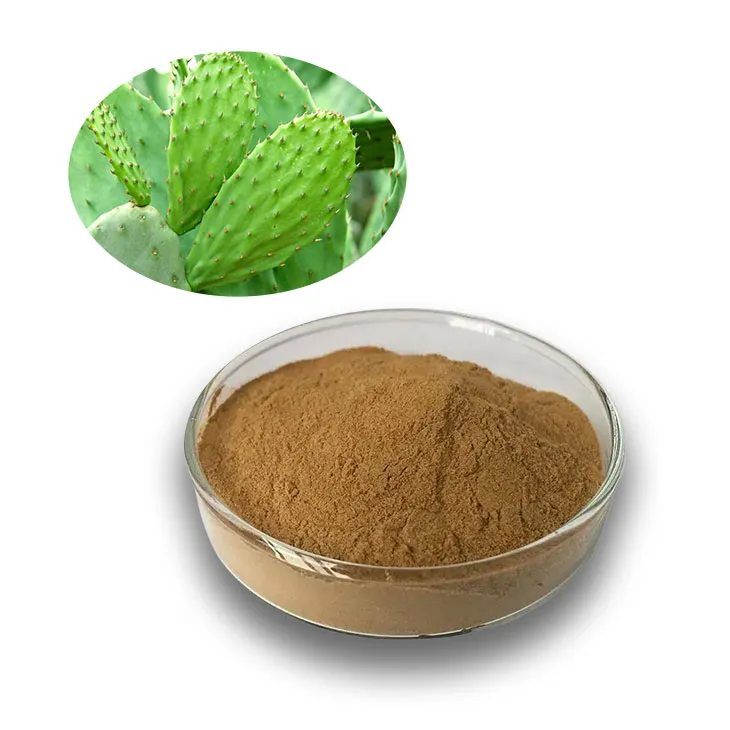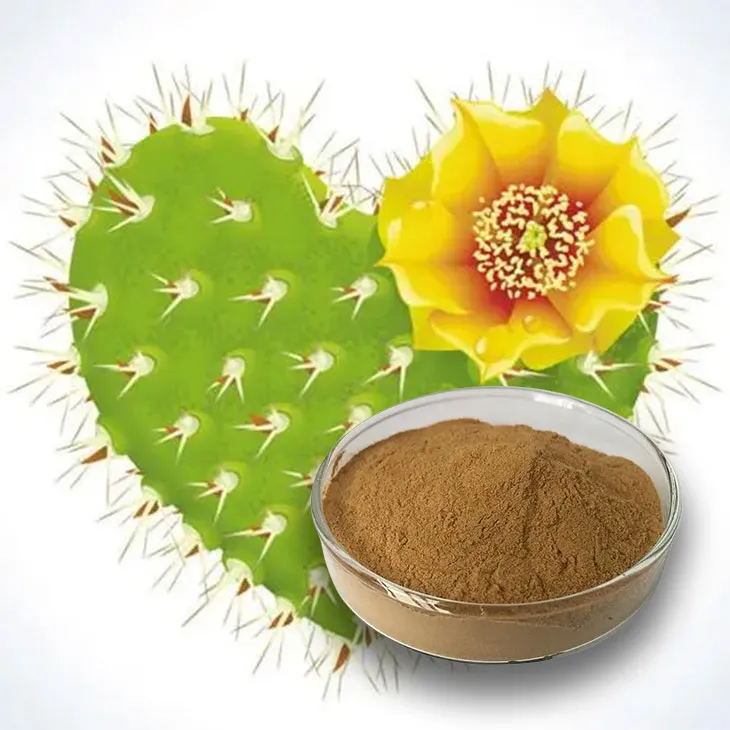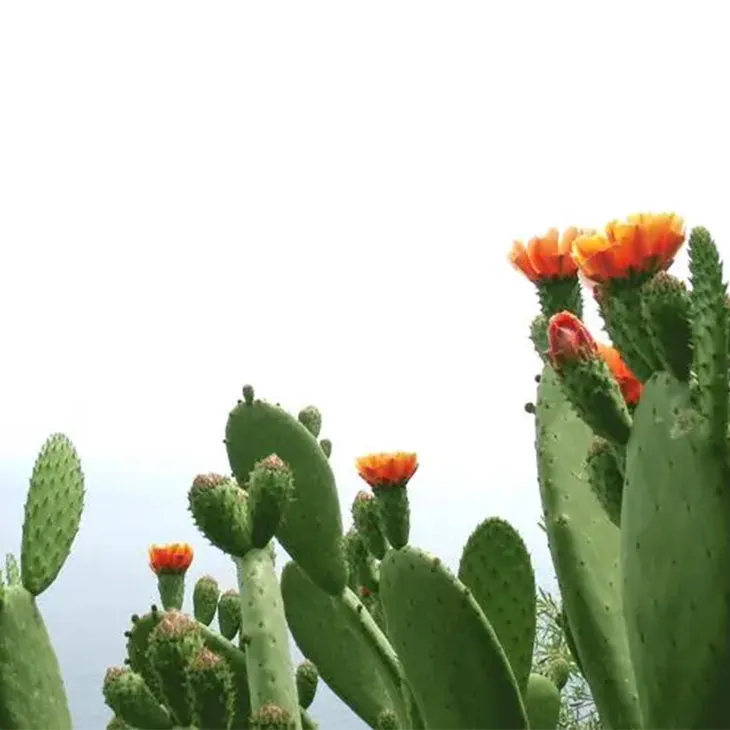- 0086-571-85302990
- sales@greenskybio.com
Cactus extract can reduce high blood pressure.
2024-11-13

Introduction
Hypertension, or high blood pressure, is a widespread health concern that affects a significant portion of the global population. It is a major risk factor for various cardiovascular diseases, such as heart attacks, strokes, and heart failure. While there are conventional medications available for treating high blood pressure, many people are seeking alternative or complementary approaches. Cactus Extract has emerged as a potential candidate in this regard, with several studies suggesting its beneficial effects on reducing blood pressure. This article aims to explore the different aspects of how Cactus Extract can play a role in combating hypertension.

Antioxidant Properties of Cactus Extract
What are Antioxidants?
Antioxidants are substances that can prevent or slow damage to cells caused by free radicals. Free radicals are unstable molecules that are produced in the body during normal metabolic processes as well as in response to external factors such as pollution, smoking, and radiation. These free radicals can cause oxidative stress, which is associated with various diseases, including hypertension.
How Cactus Extract's Antioxidants Work for Blood Pressure Reduction
Cactus extract contains a variety of antioxidants, such as flavonoids, phenolic acids, and betalains. These antioxidants work in multiple ways to help reduce blood pressure. Firstly, they can help protect the endothelial cells that line the blood vessels. Endothelial dysfunction is often associated with high blood pressure, and antioxidants can prevent damage to these cells, thereby maintaining normal vascular function. For example, flavonoids in cactus extract can enhance the production of nitric oxide in endothelial cells. Nitric oxide is a gas molecule that relaxes blood vessels, leading to a decrease in blood pressure. Secondly, antioxidants in cactus extract can reduce inflammation in the body. Inflammatory processes are also implicated in the development of hypertension, and by reducing inflammation, the extract can contribute to better blood pressure control. For instance, phenolic acids in the extract can inhibit the production of pro - inflammatory cytokines, which are molecules that promote inflammation in the body.

Types of Cactus Studied for Blood Pressure Reduction
Opuntia Cactus
Opuntia cactus, also known as prickly pear cactus, is one of the most widely studied cacti for its potential blood pressure - lowering effects. The pads and fruits of Opuntia cactus are rich in bioactive compounds that may be beneficial for blood pressure regulation. Studies have shown that extracts from Opuntia cactus can reduce systolic and diastolic blood pressure in animal models. The possible mechanisms include its antioxidant properties as mentioned above, as well as its ability to regulate electrolyte balance. For example, it may help in reducing sodium retention in the body, which is associated with high blood pressure. Additionally, Opuntia cactus extract has been shown to have a mild diuretic effect, which can also contribute to a reduction in blood pressure.
Cereus Cactus
Cereus cactus is another type of cactus that has been investigated for its effects on blood pressure. Some studies have found that Cereus cactus extract contains compounds that can interact with the renin - angiotensin - aldosterone system (RAAS). The RAAS is an important hormonal system in the body that regulates blood pressure. By interfering with the RAAS, Cereus cactus extract may help to lower blood pressure. However, more research is needed to fully understand the mechanisms and potential benefits of Cereus cactus extract in the context of hypertension.

Implications for Those Seeking Alternative Ways to Manage Hypertension
Complementary to Conventional Treatment
For individuals with hypertension, cactus extract can potentially be used as a complementary approach in addition to their existing medications. However, it is crucial that they consult their healthcare providers before starting any new supplement. This is because cactus extract may interact with certain medications, such as antihypertensive drugs or medications for other conditions. For example, if cactus extract has a diuretic effect and is combined with a prescription diuretic, it may lead to excessive fluid loss or electrolyte imbalances. Healthcare providers can assess the individual's overall health status, medications, and potential risks and benefits to determine whether cactus extract can be a suitable addition to their hypertension management plan.
Dietary Incorporation
Another option for those interested in the potential blood pressure - lowering effects of cactus is to incorporate cactus - based foods into their diet. For instance, prickly pear fruits can be consumed as part of a healthy diet. They are not only a source of the beneficial cactus extract compounds but also provide other nutrients such as vitamins, minerals, and dietary fiber. However, it should be noted that the amount of cactus extract obtained from dietary sources may be relatively lower compared to concentrated extracts in supplement form. Therefore, dietary incorporation may be more of a long - term, preventive approach rather than a quick - fix solution for high blood pressure.
Future Research Directions
While the current research on cactus extract and blood pressure reduction is promising, there are still many areas that need further investigation. More large - scale, human - based clinical trials are required to confirm the efficacy and safety of cactus extract in reducing blood pressure. These trials should also explore different dosages, treatment durations, and patient populations. Additionally, further research is needed to fully understand the complex mechanisms by which cactus extract exerts its effects on blood pressure. This includes studying the interactions between different bioactive compounds in the extract and their combined effects on the body's physiological systems related to blood pressure regulation. Finally, research should also focus on developing standardized extraction methods for cactus extract to ensure consistency in product quality and potency.
Conclusion
In conclusion, cactus extract shows potential as an alternative or complementary approach for reducing high blood pressure. Its antioxidant properties, as well as the different types of cacti being studied, offer various avenues for exploration in the context of hypertension management. However, caution should be exercised, and healthcare provider consultation is essential for those considering using cactus extract. With further research, cactus extract may play an increasingly important role in the overall management of high blood pressure in the future.
FAQ:
How does cactus extract reduce high blood pressure?
Cactus extract may reduce high blood pressure through its antioxidant properties. Antioxidants can help prevent oxidative stress in blood vessels, which is often associated with high blood pressure. By reducing this stress, the blood vessels may relax and widen, allowing for better blood flow and lower blood pressure. Additionally, certain compounds in cactus extract might also interact with the body's hormonal or regulatory systems involved in blood pressure control.
Which types of cactus are being studied for blood pressure reduction?
There are several types of cactus being studied for their potential in reducing high blood pressure. One commonly studied type is Opuntia cactus. Its extract has shown promising results in some preliminary studies. Another type might be Nopal cactus, which is also of interest due to its various bioactive compounds that could potentially affect blood pressure regulation.
Is cactus extract a safe alternative for managing hypertension?
While cactus extract shows potential in reducing high blood pressure, more research is needed to fully establish its safety as an alternative treatment. In general, cactus is considered relatively safe when consumed in moderation. However, some people may experience side effects such as gastrointestinal discomfort. Also, it's important to note that cactus extract should not replace standard medical treatment for hypertension without consulting a healthcare provider.
How long does it take for cactus extract to show an effect on blood pressure?
The time it takes for cactus extract to show an effect on blood pressure can vary widely. It depends on factors such as the individual's overall health, the specific type and dosage of cactus extract used, and the severity of their hypertension. In some cases, initial changes in blood pressure might be observed within a few weeks of starting to take cactus extract, but for more significant and consistent results, it could take several months of continuous use.
Can cactus extract be used in combination with other blood pressure medications?
Before using cactus extract in combination with other blood pressure medications, it is crucial to consult a healthcare provider. There is a potential for interactions between cactus extract and medications, which could either enhance or reduce the effectiveness of the medications or cause unexpected side effects. Some compounds in cactus extract might interfere with the way medications are metabolized in the body.
Related literature
- The Potential of Cactus Extract in Cardiovascular Health"
- "Cactus - Based Therapies for Hypertension: Current Research"
- "Antioxidant - Rich Cactus Extract and Blood Pressure Regulation"
- ▶ Hesperidin
- ▶ Citrus Bioflavonoids
- ▶ Plant Extract
- ▶ lycopene
- ▶ Diosmin
- ▶ Grape seed extract
- ▶ Sea buckthorn Juice Powder
- ▶ Fruit Juice Powder
- ▶ Hops Extract
- ▶ Artichoke Extract
- ▶ Mushroom extract
- ▶ Astaxanthin
- ▶ Green Tea Extract
- ▶ Curcumin
- ▶ Horse Chestnut Extract
- ▶ Other Product
- ▶ Boswellia Serrata Extract
- ▶ Resveratrol
- ▶ Marigold Extract
- ▶ Grape Leaf Extract
- ▶ New Product
- ▶ Aminolevulinic acid
- ▶ Cranberry Extract
- ▶ Red Yeast Rice
- ▶ Red Wine Extract
-
Saw Palmetto Extract
2024-11-13
-
Lily extract
2024-11-13
-
Agaricus Blazei Extract
2024-11-13
-
Acerola Extract
2024-11-13
-
Black Garlic Extract
2024-11-13
-
Chaste Berry Extract
2024-11-13
-
Golden Seal Extract
2024-11-13
-
Europen Bilberry Extract
2024-11-13
-
Ginseng Root Extract
2024-11-13
-
Artichoke Leaf Extract
2024-11-13





















